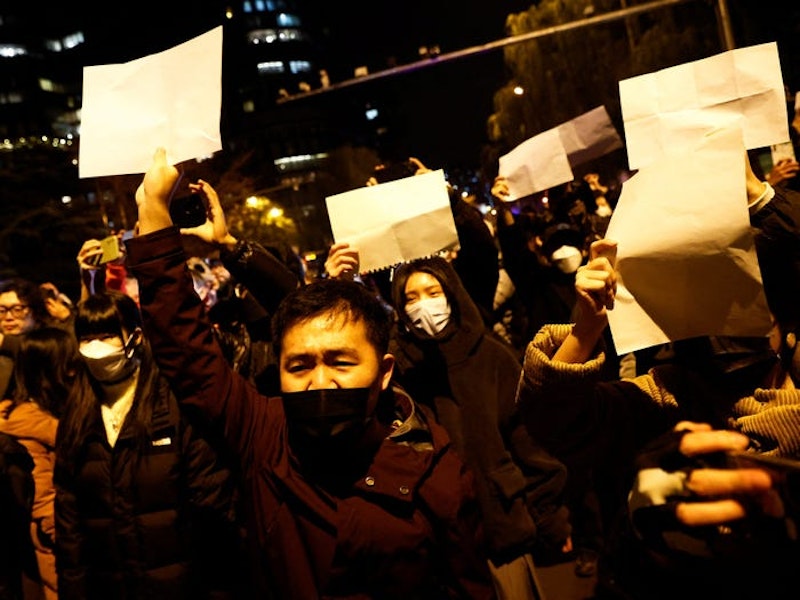Recent protests in China have created an amazing new symbol of freedom, a new word for it, a new picture, a new image for a very old truth: the blank sheet of paper.
No society has ever policed expression as thoroughly or effectively as the People's Republic of China does now, partly because it’s operating in a technological environment of which previous totalitarian regimes could only dream. They attempt to monitor everyone's communication all the time. In that atmosphere, the blank sheet of paper as a sign, poster, and slogan is a work of superb subversive genius. One of the people who immediately saw the possibilities is the great Chinese artist Ai Weiwei, who on Saturday set up shop in London's Hyde Park and started distributing "blank" sheets of paper, which he signed with ink that's only visible under ultraviolet light. He poses with the sheets, his middle finger extended across the surface.
I take the blank sheet phenomenon to be a particularly vivid demonstration that speech is harder to repress than many dictators, and many others, hope. Let me ask you this, Xi Jinping, because you probably know: how many blank sheets of paper are there in China right now? Every one of them is an anti-Xi poster, bubba. They’re piled up everywhere. You’re surrounded by them, fool.
But you don't have to be a peak communist-capitalist dictator to want to erase bad words. The reasons things aren't going absolutely perfectly, according, let's say, to Joe Biden, Nobel prize winners and the "mainstream left," has a direct and obvious explanation: the forces of evil haven’t been entirely silenced. Our opponents are obviously blatantly breathtakingly wrong, many believe. Equivalently: we’re obviously blatantly breathtaking right. So it’s a mystery how our opponents can prosper. How do they do it? By the fiendish manipulation of human communication. They use bad, bad words that must be banned. When their "thoughts" can no longer be expressed at all, because the vocabulary for doing so has been deleted from social media, then their thoughts can no longer spread. Voila, utopia. Content moderation will set us free.
The "ideas" underlying these positions run like this: "words are powerful," and that power is, as virtually every professor of the science of communication teaches, strictly supernatural. A racial slur or wrong pronoun is an act of violence as well as an act of propaganda. A recently developed concept, stochastic terrorism, equates using wrong words to flying airplanes into skyscrapers. Hearing bad words makes people do bad things. The solution is easy: delete delete delete.
Well, go ahead and delete all communication if you have to. But once you have, the blank space you leave is itself a communication. Stare into that white void, Xi, Joe, Maria, and it stares implacably back. Deleting the void, if it were possible, would only redouble it.
You could’ve learned this earlier in your social media panic, when you were worried that Twitter was being infiltrated by a far-right agent named Pepe the Frog. It was important for a second there to content-moderate Pepe the Frog off the internet, but Pepe the Frog was a completely arbitrarily-selected cartoon character who could be replaced at a moment's notice. Language is conventional. I can use any word or image to mean anything I want, as long as there's a group of people who share this understanding, or come to.
Some years ago, people on Chinese social media started referring to Xi as "Winnie the Pooh." It took months for the authorities to start deleting all references to "the bear of very little brain." To which a real subversive can only respond: Gotcha! What should we try next? If you delete that too, the empty space you leave after that will be staring back at you. The silence is shouting insults at you. You cannot but lose.
Governments can crack down brutally on expression. This has concrete effects in ruining people's lives for no defensible purpose. But one thing it can’t do is make it impossible to disagree with you, or to express that disagreement. Human communication is uncontrollable. One of the reasons for this is that language isn’t the sort of thing that, say, Kamala Harris thinks it is. It’s not a shed full of tools, each of which is suited to a specific purpose. It’s not an arsenal of weapons whose specs you could enumerate and compare. It's a volatile liquid environment, a flood. Nothing stays still for very long. There are no permanent enduring meanings that you can pluck from the flotsam, that you could use as tools or weapons, or preserve in your museum.
Words, as philosophers such as Ludwig Wittgenstein and J.L. Austin argued, mean whatever we use them to mean. If you can establish a meaning convention, even within a tiny community, you can easily create a word or shift the meaning of an existing one. People do it all the time. The blank sheet of paper as the word and image of resistance is a beautiful and fundamental expression of this fact.
I think that Ai Weiwei is taking the wrong approach. Even invisible ink is ink, after all, and even his name is an inscription. No finger is necessary; the signature and the finger would just make Ai's work simply repressible on the grounds that it directly expresses insult as well as Ai's ego. His interpretation of the blank sheet of paper seems old-fashioned or "modernist": it's a bit about his genius. He couldn't quite endorse the blankness, still needed to throw some yang into the void of yin.
But the profundity of the Tao, as Laozi reminds us, is silence and emptiness. It's coming for you, Xi, and for censors everywhere, trying to teach them some rudimentary lessons about meaning.
—Follow Crispin Sartwell on Twitter: @CrispinSartwell

